|
|
 |
|
Calanoida ( Order ) |
|
|
|
Clausocalanoidea ( Superfamily ) |
|
|
|
Aetideidae ( Family ) |
|
|
|
Gaetanus ( Genus ) |
|
|
| |
Gaetanus brevispinus (Sars, 1900) (F,M) | |
| | | | | | | Syn.: | Chiridius brevispinus Sars, 1900 (p.68, figs.F);
? Gaidius major Wolfenden, 1904 (p.114, Rem.F,M);
Gaidius intermedius Wolfenden, 1905 (p.6, figs.F); Farran, 1929 (p.208, 231); Hardy & Gunther, 1935 (1936) (p.157, Rem.); Davis, 1949 (p.27, Rem.F); Vervoort, 1951 (p.81, Rem.); 1957 (p.6, 60, Rem.); Björnberg, 1973 (p.323, 386); Park, 1978 (p.131, figs.F,M, Rem.); Bradford & Jillett, 1980 (p.58, fig.F, distribution chart); Razouls, 1994 (p.73, figs.F,M); Errhif & al., 1997 (p.422);
Gaetanus intermedius : Séret, 1979 (p.71, figs.F); ? Hopkins, 1985 (p.167); Dearborn & al., 1986 (p.1, predation by benthic star); ? Hopkins & Torres, 1988 (p.82, tab.2); ? Rau & al., 1991 (p.1, isotopic forms vs feeding); ? Razouls & al., 2000 (tab. 5, Appendix); Schnack-Schiel & al., 2008 (p.1045: Tab.2); Ohashi & al., 2013 (p.44, Table 1, Rem.);
Mesogaidius intermedius : Wolfenden, 1911 (p.224, figs.F);
Gaidius robustus Vervoort, 1949 (p.12, figs.F);
Gaidius affinis Sars, 1905 (p.9); 1925 (p.47, figs.F,M); Farran, 1908 b (p.32, Rem.); 1926 (p.249: juv., Rem.); Rose, 1933 a (p.97, figs.F,M); Jespersen, 1934 (p.60); Wilson, 1942 a (p.188); Sewell, 1948 (p.499, 545, 550, 566, 568); C.B. Wilson, 1950 (p.233); Vervoort, 1952 d (n°45, p.3, figs.F,M); 1957 (p.6, 56, figs.F, Rem.); 1963 b (p.126, Rem.); Grice, 1963 a (p.495); Björnberg, 1973 (p.323, 386); Harding, 1974 (p.141, Table 2, gut contents); Park, 1975 a (p.11); Vives & al., 1975 (p.41, tab.II, XII); Bradford & Jillett, 1980 (p.58, figs.F,M, distribution chart);
Gaetanus affinis : Park, 1975 a (p.13); Deevey & Brooks, 1977 (p.256, Table 2, station "S"); Vives, 1982 (p.291);
Gaidius brevispinus Sars, 1903 (p.162, figs.F); Pearson, 1906 (p.13, Rem.); With, 1915 (p.94, figs.F,M); Sars, 1925 (p.48); Rose, 1933 a (p.97, figs.F); Jespersen, 1934 (p.60); 1940 (p.19); Brodsky, 1950 (1967) (p.159, figs.F,M); Østvedt, 1955 (p.14: Table 3, p.61); Tanaka, 1957 a (p.62, figs.F, no M); Minoda, 1958 (p.253, Table 1, 2, abundance); M.W. Johnson, 1963 (p.89, Table 1, 2); Tanaka & Omori, 1970 (p.119, Rem.); Minoda, 1971 (p.24); Shih & al., 1971 (p.32, 143, Rem.); Vidal, 1971 a (p.15, 26, 114, figs.F, M); Harding, 1974 (p.141, Table 2, gut contents); Peterson & Miller, 1976 (p.14, Table 1, 3, abundance vs interannual variations); Park, 1978 (p.127); Buchanan & Sekerak, 1982 (p.41, vertical distribution); Tupitsky, 1982 a (p.110, figs.); Hattori, 1991 (tab.1, Appendix); Richter, 1994 (tab.4.1a); Chihara & Murano, 1997 (p.687, Pl.45,46: F,M);
Ref. compl.: Lysholm & Nordgaard, 1921 (p.13); Wilson, 1942 a (p.188); Lysholm & al., 1945 (p.13); Sewell, 1948 (p.496, 499); C.B. Wilson, 1950 (p.234); Grice & Hulsemann, 1965 (p.223); Harding, 1966 (p.17, 66, 71); Vinogradov, 1968 (1970) (p.256, 266); Morris, 1970 (p.2300); Björnberg, 1973 (p.323, 386); Peterson & Miller, 1977 (p.717, Table 1, seasonal occurrence); Groendahl & Hernroth, 1986 (tab.1); Kosobokova, 1989 (p.26); Mumm, 1993 (tab.1, fig.2); Hanssen, 1997 (tab.3.1); Falkenhaug & al., 1997 (p.449, spatio-temporal pattern); Bragina, 1999 (p.195); Razouls & al., 2000 (p.343, tab. 5, Appendix); Yamaguchi & al., 2002 (p.1007, tab.1); Auel & Hagen, 2002 (p.1013, tab.2); G. Harding, 2004 (p.43, figs.F,M); Ikeda & al., 2006 (p.1791, Table 2); Gaard & al., 2008 (p.59, Table 1, N Mid-Atlantic Ridge); Homma & al., 2011 (p.29, Table 2, 3, abundance, feeding pattern: suspension feeders); Matsuno & al., 2011 (p.1349, Table 1, abundance vs years); Matsuno & al., 2012 (Table 2) | | | | Ref.: | | | Markhaseva & Razzhivin, 1992 (1993) (p.611); Markhaseva, 1996 (p.187, figs.F,M, Notes. p.189); Bradford-Grieve & al., 1999 (p.879, 922, figs.F,M); Vives & Shmeleva, 2007 (p.576, figs.F,M, Rem.) | 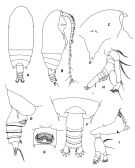 issued from : T. Park in Antarct. Res. Ser. Washington, 1978, 27. [p.132, Fig.18]. As Gaidius intermedius. Female: A, habitus (dorsal view); B, idem (right lateral side); C, forehead (right lateral side); D, rostrum (anterior view); E, posterior part of metasome and urosome (right lateral side); F, idem (dorsal view); G, genital segment (ventral view); H, A2; I, Md.
|
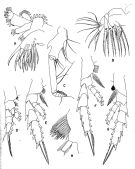 issued from : T. Park in Antarct. Res. Ser. Washington, 1978, 27. [p.133, Fig.19]. As Gaidius intermedius. Female: A, Mx1; B, Mx2; C, Mxp; D, P1 (anterior view); E, P2 (idem); F, P3 (idem); G, P4 (posterior view); H, medial part of coxa of P4 (posterior view)
|
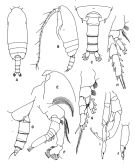 issued from : T. Park in Antarct. Res. Ser. Washington, 1978, 27. [p.134, Fig.20]. As Gaidius intermedius. Male: A, habitus (dorsal view); B, idem (left lateral side); C, posterior part of metasome and urosome (dorsal view); D, idem (left lateral side); E, forehead (left lateral side); F, A2; G, P1 (anterior view); H, P2 (idem); I, P5 ( (posterior view); J, 2th and 3th exopodal segments of left P5 (posterior view).
|
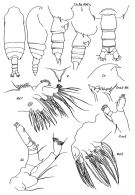 issued from : E.L. Markhaseva in Proc. Zool. Inst. RAN, St. Petersburg, 1996, 268. [p.191, Fig.149]. Female (from Arctic Basin: Central part). R: rostrum (anterior); Ce: forehead (lateral); P.md: mandibular palp; Gntb Md: Gnathobase of Md (partial).
|
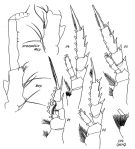 issued from : E.L. Markhaseva in Proc. Zool. Inst. RAN, St. Petersburg, 1996, 268. [p.192, Fig.150]. Female. CP4: coxopod of P4 (partial).
|
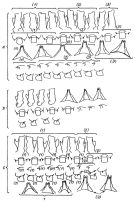 issued from : E.L. Markhaseva in Proc. Zool. Inst. RAN, St. Petersburg, 1996, 268. [p.193, Fig.151]. Female. Types of protopod of Mxp, Th5 & genital segment, rostrum in specimens from: A - (1) the central part of Arctic Basin, (2) the Norwegian Sea, (3) the north-western part of the Pacific Ocean; B - Northern Atlantic; C - (1) south-western part of the Pacific Ocean.
|
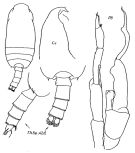 issued from : E.L. Markhaseva in Proc. Zool. Inst. RAN, St. Petersburg, 1996, 268. [p.194, Fig.152]. Male (from Kuril Trench). Ce: cephalosome right side, lateral).
|
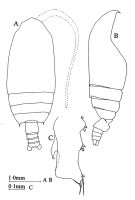 issued from : J.M. Bradford & J.B. Jillett in Mem. N.Z. oceanogr. Inst., 86, 1980. [p.59, Fig.38]. As Gaidius affinis. Female: A, habitus (dorsal); B, idem (lateral right side); C, basipod 1 of Mxp. Nota: basipod 1 of P4 with approximately 20 hair-like tubes on the inner posterior surface of the New Zealand specimens.
|
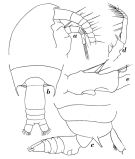 Issued from : W. Vervoort in Zool. Verh., Leiden, 1949, 5. [p. 13, Fig.5]. As Gaidius robustus. Female (from Flores Sea): a, forehead (lateral); b, distal part of thorax and urosome (dorsal); c, idem (lateral right side); d, Mxp; e, 1st basal segment of Mxp. Nota: Head and 1st thoracic segment, 4th and 5th completerly fused. The abdominal segments and furca in the proportional lengths 39:15:13:11:22 = 100. A1 (24-free segments) scarcely reaches the lateral thoracic margin.
|
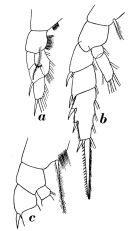 Issued from : W. Vervoort in Zool. Verh., Leiden, 1949, 5. [p. 13, Fig.5]. As Gaidius robustus. Female (from Flores Sea): a, P1; b, P2; c, basal portion of P4. Nota: Posterior surface of the basipod of P4 with 5-6 rows of fine, hair like tubes riunning across the segment in its distal corner.
|
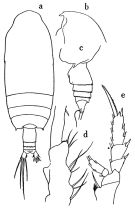 issued from : O. Tanaka in Publ. Seto Mar. Biol. Lab., 1957, VI (1). [p.63, Fig.38]. As Gaidius brevispinus. Female (from Sagami, Japan): a, habitus (dorsal); b, forehead (lateral); c, last thoracic segment and urosome (lateral left side); d, 1st basal segment of Mxp; e, P2. Nota: lateral corners of last thoracic segment broadly rounded, with short oblique spine. Rostrum one-pointed, slightly notched at the apex. Proportional lengths of urosomites and furca 40:15:9:17:19 = 100. A1 (24-segmented) reaches back to distal end of 3rd urosomal segment. mx2 has a lamellous process on the posterior margin about the middle of 1st basal segment.
|
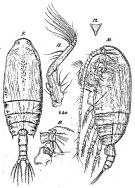 Issued from: G.O. Sars in Résult. Camp. Scient. Prince Albert I, 69, pls.1-127 (1924). [Pl.XIV, figs. 9-13]. Female: habitus (dorsal); 10, idem (lateral left side); 11, forehead (lateral); 12, rostrum (frontal view); 13, Mxp.
|
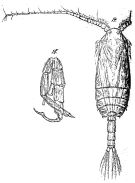 Issued from: G.O. Sars in Résult. Camp. Scient. Prince Albert I, 69, pls.XV-127 (1924). [Pl.I, figs. 14-15]. As Gaidius affinis. Male: 14, habitus (dorsal); 15, P5.
|
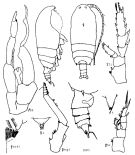 Issued from : K.A. Brodskii in Calanoida of the Far Eastern Seas and Polar Basin of the USSR. Opred. Fauna SSSR, 1950, 35 (Israel Program for Scientific Translations, Jerusalem, 1967) [p.160, Fig.72]. As Gaidius brevispinus. Female (from NW Pacif.): habitus (dorsal and lateral right side); R, rostrum; Mp2, Mxp; urosome (lateral right side); S1, P1; S2, P2; S4B1, inner distal margin of basipdal segment 1 of P4.
|
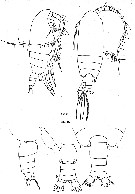 issued from : W. Vervoort in B.A.N.Z. Antarctic Reseach Expedition, Report Ser. B, Vol. III., 1957 [Figs.35, 36]. As Gaidius affinis. Female (from 47°43'S, 76°48'E): Fig.35: a-b, habitus (lateral and dorsal, respectively). Fig.36: a, c, posterior part cephalothorax and urosome (lateral and dorsal, respectively); b, urosome (ventral).
|
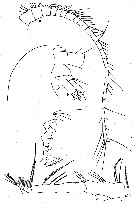 issued from : W. Vervoort in B.A.N.Z. Antarctic Reseach Expedition, Report Ser. B, Vol. III., 1957 [Fig.37]. As Gaidius affinis. Female: a, left A1; b, forehead (lateral); c, Md (cutting edge); d, right Mxp.
|
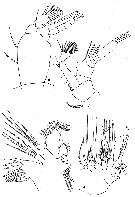 issued from : W. Vervoort in B.A.N.Z. Antarctic Reseach Expedition, Report Ser. B, Vol. III., 1957 [Fig.38]. As Gaidius affinis. Female: a, left Md (mandibular palp); b, left A2; c, right Mx1; d, left Mx2.
|
 issued from : W. Vervoort in B.A.N.Z. Antarctic Reseach Expedition, Report Ser. B, Vol. III., 1957 [Fig.39]. As Gaidius affinis. Female: a, right P1 (anterior); b-d, P2 to P4 (left legs).
|
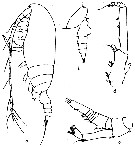 issued from : R.N. Wolfenden in Die Marinen Copepoden der Deutschen Südpolar-Expedition 1901-1903, 1911. [224, Fig.12]. As Mesogaidius intermedius. Female: a, habitus (lateral); b, posterior part cephalothorax and urosome (lateral); c, A2; d, Mxp.
|
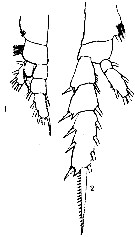 issued from : R.N. Wolfenden in Die Marinen Copepoden der Deutschen Südpolar-Expedition 1901-1903, 1911. [Pl.XXVI, Figs.1-2]. As Mesogaidius intermedius. Female: 1, P1; 2, P2.
|
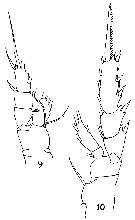 issued from : G.P. Farran in Fish. Ire. Sci. Invest., 1906, II [1908]. [Pl. II, Figs.9-10]. As Gaidius affinis. Female (from W Ireland): 9, P1; 10, P2. Nota: Identification confirmed by G.O. Sars.
|
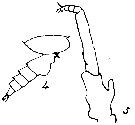 issued from : R.N. Wolfenden in Plankton Studies Part I. Copepoda. 1905 [Pl.III, 4-5]. As Gaidius intermedius. Female: 4, last thoracic segment and urosome (right lateral); 5, Mxp.
|
 issued from : C. With in The Danish Ingolf-Expedition, 1915, III (4). [p.95, Text-Fig.24, a-f]. As Gaidius brevispinus. Female (from 61°-66°N, 17°-28°W): a, head (lateral; with parasite attached to left Mx2); b, left P1 (anterior); c, right P2 (anterior). Nota : The shape of the body is as figured by Sars, except for the distinctly longer lateral spines of the last thoracic segment, which are directed downwards and backwards. Caudal rami 1.4 as long as wide, and a little shorter than the anal segment. A1 do not reach to the end of the anal segment, but only somewhat beyond the end of the genital segment ; segment 2 is 1.1 as long as 8-9, which is scarcely 1.1 as long as 13, and 1.2 shorter than segment 20 and 22 which are of almost equal length, and longer than segment 2 ; the appendages differ from those of G. tenuispinus by the presence of a posterior seta in segment 13. A2 have the exopod about 1.5 as long as endopod. Mx1 : inner lobe 3 with 4 setae in addition to the sensory lobe ; 3rd exopodite with 6 anterior setae + 1 posterior seta. Mx2 : exterior margin less strongly convex than G. tenuispinus ; posterior seta 2 of the 1st lobe 3 times as long as the lobe itself, and posterior seta of 4th lobe stronger as well as longer than the corresponding posterior seta of 5th lobe. Mxp differs from those of G. tenuispinus by a rounded lamelliform protuberance on the exterior surface of the basipodite 2. Male: d, forehead (lateral); e, last thoracic segment and urosome (lateral, left side); f, habitus (lateral).
|
 issued from : C. With in The Danish Ingolf-Expedition, 1915, III (4). [Pl. II, Figs 7a--7g]. As Gaidius brevispinus. Female : 7a, rostrum (observed from beow); 7b, last thoracic segment and urosome with spermatophore (lateral, left side); 7c, genital area; 7d, exterior margin of left Mx2 (posterior view); 7e, inner margin of basipod of left P4 (posterior view); 7f, labrum and labium (g2 and g4 the 2nd and 4th group of the lateral longitudinal series; S1-S7 the seven lateral series of hairs upon, between and behind the labial lobes). Nota: Rostrum not individed, but distinctly bifurcate terminally. On each side of the vulva a somewhat triangular plate, and a short seminal receptacle fig.7b) ; structure of the genital apparatus rather complicated (figs.7b-c). Oral surface of the labrum with a well developed longitudinal series of hairs, which are, however, only indistinctly divided into 5 groups (fig.7f) ; group 3 fairly well marked, and group 4 has in addition to the inner series a lateral one with to short hairs.The granular lamina labialis with the area in front of it is shown in fig.7f. Behind the lamina labialis four partly fused groups of short spines are placed near the middle line ; on the area labialis and lobi labiales altogether 5 longitudinal series of hairs (fig.7f : S1-S5) arranged as shown in figure. Male: 7g, inner margin of basipod of left P4 (posterior view).
|
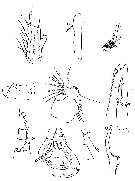 issued from : C. With in The Danish Ingolf-Expedition, 1915, III (4). [Pl. III, Figs 1a--1j]. As Gaidius brevispinus. Female: 1a, basipod of left Mxp (posterior); 1b, same (basipod 3; 1c, distal portion of basipod of left P4 (posterior). Male: 1d, Md (masticatory blade); 1e, left Mx1 (posterior); 1f, left Mxp (posterior); 1g, left P1 (anterior); 1h, P5 (posterior); 1i, terminal segment of left P5; 1j, terminal segment of right P5. Nota: Manducatory part of Md thin-skinned. Mx1 fairly well developed; 1st outer lobe with 9 setae, inner lobe 1 without sete, but a number of short rounded sensory organs; inner lobe 2quite rudimentary, and inner lobe 3 has at least one real setae, possesses similar organs; the 3rd basipod has at least 2 setae and the endopod I-III 3 + 3 + 6 setae, exopod with 11 setae. Mxp have the 3rd basipod 1.3 as long as basipod 1-2 and 2.5 as long as endopod.; the basipodites 1-2 have a rudimentary inner lobe 1 and a fairly well developed inner lobe 4. P5 very similar to that of G. tenuispinus, but the basal segments are comparatively shorter, especially the third one of the right side. The left endopodite shows no trace of segmentation, and has no small terminal seta; the left exopodite 3 as in fig. 1i, a rather characteristic structure.
|
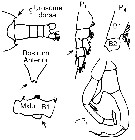 issued from : G. Harding in Key to the adullt pelagic calanoid copepods found over the continental shelf of the Canadian Atlantic coast. Bedford Inst. Oceanogr., Dartmouth, Nova Scotia, 2004. [p.43]. As Gaidius brevispinus. Female & Male. Nota: Female: Last thoracic segment with spines short. P1 with endopodal segments 1 and 2 distinctly separated (arrowed). Coxa of P4 with 20 to 24 narrow spines.
|
 Gaetanus brevispinus Gaetanus brevispinus female: 1 - Cephalon without frontal spine. 2 - Posterior corners of last thoracic segment with moderate spines. 3 - Exopodal segment 1 of A2 without setae; segment 2 with 2 setae. 2nd internal lobe of Mx1 with 4 setae. Exopod of P1 3-segmented with 2 external spines. 4 - Mxp protopodite with lateral plate, its shape varying.
|
 Gaetanus brevispinus Gaetanus brevispinus male: 1 - Cephalon without frontal spine. 2 - Cephalon without crest in anterior part. 3 - Exopodal segment 3 of left P5 stylet-like. Body size < 5 mm. 4 - Posterior corners of last thoracic segment with spines. 5 - Spines significantly shorter than the border of genital segment. 6 - Exopodal segment 3 of P5 with stylet-like wide.
|
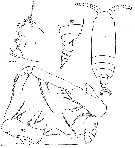 Issued from : C. Séret in Thesis UPMC, Paris 6. 1979 [Pl. XI, figs.66-70]. As Gaetanus intermedius. Female (from off N Kerguelen Is.): 66, habitus (dorsal); 67, two last thoracic segments and urosome (lateral); 68, Md (masticatory edge); 69, right Mxp; 70, left Mxp.
|
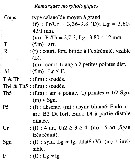 Issued from : C. Razouls in Ann. Inst. océanogr., Paris, 1994, 70 (1). [p.73]. Caractéristiques morphologiques de Gaetanus brevispinus as Gaidius intermedius femelle et mâle adultes. Terminologie et abbréviations: voir à Calanus propinquus.
| | | | | Compl. Ref.: | | | Tremblay & Anderson, 1984 (p.3, Rem.); Kosobokova & al., 1998 (tab.2); Auel, 1999 (tab.2); Lapernat, 2000, (tabl.3, 4); Kosobokova & Hirche, 2000 (p.2029, tab.2); Holmes, 2001 (p.48); Hop & al., 2006 (p.182, Table 4); Kosobokova & al., 2007 (p.919, Tab.2, 4, 6, 7, fig.2); Blachowiak-Samolyk & al., 2007 (p.2716, Table 2); Blachowiak-Samolyk & al., 2008 (p.2210, Table 3, biomass); Morales-Ramirez & Suarez-Morales, 2008 (p.517); Gaard & al., 2008 (p.59, Table 1, N Mid-Atlantic Ridge); Galbraith, 2009 (pers. comm.); Laakmann & al., 2009 (p.741, fig.2, vertical distribution, lipids analysis); Laakmann & al., 2009 (p.679, fig.2, 4, Table 2); Park & Ferrari, 2009 (p.143, Table 4, 7: common deep water species, Appendix 1, biogeography); Kosobokova & Hopcroft, 2010 (p.96, Table 1, fig.7); Homma & Yamaguchi, 2010 (p.965, Table 2); Dvoretsky & Dvoretsky, 2010 (p.991, Table 2); Hidalgo & al., 2010 (p.2089, Table 2); Bucklin & al., 2010 (p.40, Table 1, Biol mol.); Hirche & Kosobokova, 2011 §p.2359, Table 3, abundance, biomass %); Kosobokova & al., 2011 (p.29, Table 2, fig.8, Rem.: Arctic Basins); Laakmann & al., 2012 (p.535, Table 1, fig.2, Rem.: mol. Biol.); Hidalgo & al., 2012 (p.134, Table 2) ; Teuber & al., 2013 (p.1, Table 1, 3, abundance vs oxygen minimum zone, enzyme activity); in CalCOFI regional list (MDO, Nov. 2013; M. Ohman, comm. pers.); Smoot & Hopcroft, 2016 (p.1, fig.7, vertical distribution) | | | | NZ: | 22 | | |
|
Distribution map of Gaetanus brevispinus by geographical zones
|
| | | | | | | | | | | | | | | 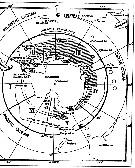 issued from : W. Vervoort in B.A.N.Z. Antarctic Reseach Expedition, Reports - Ser. B, Vol. III, 1957 [Fig.40]. As Gaidius intermedius. issued from : W. Vervoort in B.A.N.Z. Antarctic Reseach Expedition, Reports - Ser. B, Vol. III, 1957 [Fig.40]. As Gaidius intermedius.
Chart showing the geographical distribution (white triangle) in the seas surrounding the Antarctic continent.
Nota: In this chart the area frequented by whaling vessels has been hatched. The Antarctic circle (66°.5 S) has been drawn as a broken line. The numbers I to VI refer to the sectors into which the Antarctic seas are divided according to Mackintosh (1942) (after Vervoort, 1951). |
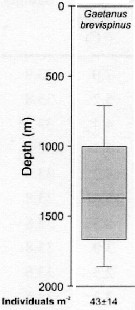 issued from : S. Laakmann, M. Stumpp & H. Auel in Polar Biol., 2009, 32. [p.682, Fig.2]. issued from : S. Laakmann, M. Stumpp & H. Auel in Polar Biol., 2009, 32. [p.682, Fig.2].
Vertical distribution (stages C3 to C6 from Antarctic Polar Front: Atlantic sector).
Error bars encompass the 5th to the 95th percentile. Abundance data are given as mean ± SD. |
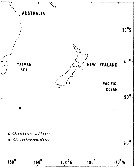 Issued from : J.M. Bradford & J.B. Jillett in New Zealand Ocean. Inst. Memoir, 86, 1980. [p.86-87, Figs.62]. Issued from : J.M. Bradford & J.B. Jillett in New Zealand Ocean. Inst. Memoir, 86, 1980. [p.86-87, Figs.62].
Distribution Gaidius affinis (= Gaetanus brevispinus) and Gaidius intermedius ( = Gaetanus brevispinus) in the Tasman Sea and around New Zealand. |
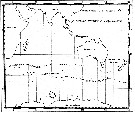 Issued from : C. Séret in Thesis 3ème Cycle, UPMC, Paris 6. 1979, Annexe. [p.37]. Issued from : C. Séret in Thesis 3ème Cycle, UPMC, Paris 6. 1979, Annexe. [p.37].
Geographical occurrences of Gaetanus intermedius (= G. brevispinus) in the Indian antarctic zone. [after publications from: Brady, 1883, 1918; Thompson, 1900; Wolfenden, 1908, 1911; With , 1915; Rosendorn, 1917; Farran, 1929; Sewell, 1929, 1947; Brady & Gunther, 1935; Steuer, 1929, 1392, 1933; Ommaney, 1936; Vervoort, 1957; Tanaka, 1960; Brodsky, 1964; Seno, 1966; Andrews, 1966; Grice & Hulsemann, 1967; Seno, 1966; Frost & Fleminger, 1968; Voronina, 1970; Zverva, 1972].
C. Séret notes the occurrence at station 56°S, 70°E. |
 Issued from : S. Laakmann, M. Kochzius & H. Auel in Deep-Sea Res. I, 2009, 56. [p.745, Fig.2 b]. Issued from : S. Laakmann, M. Kochzius & H. Auel in Deep-Sea Res. I, 2009, 56. [p.745, Fig.2 b].
Vertical distribution abundance of copepodite stages C3 to C6 of Gaetanus spp. +: No occurrence; solid line depicts bottom profile (right axis); station 853 over the Yermak Plateau (81°22'N, 6°52'E) is separated from the other stations on the transect; other stations between East Greenland Current, the Fram Strait and the West Spitsbergen Current, into south return Atlantic Current (77°46'N-79°36'N, 6°20'E-7°29'W).
Deep-sea copepods collected from August 20 to September 16, 2006. |
| | | | Loc: | | | Antarct. (Peninsula, Weddell Sea, Sw & S Atlant., Indian, S & SW Pacif.), South Georgia, sub-Antarct. (Indian, SW & SE Pacif.), off N Prince Edward Is., Namibia (in Carola, 1994), off E Tristan da Cunha, Angola, G. of Guinea, off Mauritania, off Madeira, off E Azores, off Bermuda: Station "S" (32°10'N, 64°30'W); Sargasso Sea, Cape Hatteras, off SE Cape Cod, off Woods Hole, G. of St. Lawrence, Greenland Sea, Fram Strait, Spitsbergen, Kongsfjorden, N Norway (Malangen fjord), Norwegian Sea, Baffin Bay, S Davis Strait, Iceland, Arct. (all polar Basins, central, Fletcher's Ice Is., Nansen Basin, Lomonosov Ridge), Chukchi Sea, Bering Sea, Canada Basin, Canadian abyssal plain, Faroe Is., Barents Sea, Laptev Sea, W Ireland, North Sea, Bay of Biscay, Ibero-moroccan Bay, W Medit. W (Balearic Sea), Sulu Sea, Philippines, China Seas (Hong Kong), Japan (Izu, off Sanriku, Hokkaido), Station Knot, Okhotsk Sea, Kuril-Kamchatka, S Aleutian Is., Bering Sea (S, SW), off S Aleutian, S Aleutian Basin, Beaufort Sea, NE Pacif., off Cape Flattery, Vancouver Is. (in C.B. Wilson, 1950), Oregon (off Newport), New Zealand, W Baja California, off Galapagos, W Costa Rica, off Peru, Chile (N-S, off Santiago).
Type locality: Arctic Basin. | | | | N: | 112 ? | | | | Lg.: | | | (1) F: 3,6; M: 2,3; (7) F: 4,05; M: 3,84; (10) F: 4,15-4; (14) F: 3,8-3,7; M: 2,08; (22) F: 4,8-4; M: 4-3,1; (24) F: 4,5-3,9; (25) F: 4,09; F: 4,59-4,19; (31) F: 4,83-4,74; (35) F: 4,6-4,32; (37) F: 4,9-3,6; M: 4,1-2,3; (39) F: 4,4; (41) F: 4-3,9; (65) F: 4,8; (113) F: 4,9-4,3; (134) F: 4,8; (208) F: 4,75; M: 4; (229) F: 4,65; M: 3,1; (246) F: 4,37-4,18; (1001) F: 4,25-4,55; (1089) F: 4,6-4,8; M: 3,1-3,4; {F: 3,60-4,90; M: 2,08-4,00} | | | | Rem.: | meso-bathypelagic, hadopelagic.
Sampling depth (Antarct., sub-Antarct.) : 0-600; 100-1000 m. Sargasso Sea (Station "S"): 500-2000 m. 2000-1000 m (Harding, 1974).
According to Vervoort (1951, p.82) , the female of Gaidius intermedius (= Gaetanus brevispinus) is easily recognized by the distinct, ventrally curved, slender lateral spines, the tubercle on the 2nd exopodal segment of A2, the lamella on the 1st segment of Mxp (acutely pointed in the specimens from the 'Willem barendsz'' collection) and the shape of the rostrum; the short, notched rostrum is so much depressed that it points obliquely downwards; it is so much hidden by the basal portions ofthe A1 that it is almost invisible. The rostrum makes it distinguishable from the closely allied Gaetanus affinis, described by Sars (1905, 1925).
See remark on Gaetanus simplex. | | | Last update : 26/01/2017 | |
|
|
 Any use of this site for a publication will be mentioned with the following reference : Any use of this site for a publication will be mentioned with the following reference :
Razouls C., Desreumaux N., Kouwenberg J. and de Bovée F., 2005-2026. - Biodiversity of Marine Planktonic Copepods (morphology, geographical distribution and biological data). Sorbonne University, CNRS. Available at http://copepodes.obs-banyuls.fr/en [Accessed February 08, 2026] © copyright 2005-2026 Sorbonne University, CNRS
|
|
 |
 |




































